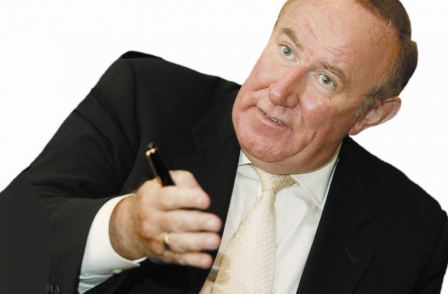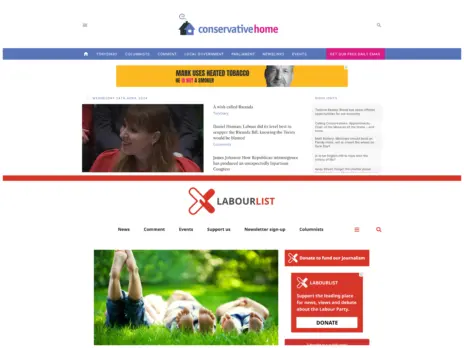
GB News, which promises US-style TV news programming built around strong presenters, is set to launch early next year – but in the age of digital is a TV news channel still an interesting proposition to advertisers?
The channel will be a first for the UK, eschewing rolling news for appointment-to-view programmes. It takes its inspiration from the likes of Fox News and MSNBC in the US, but will have to fit within Ofcom’s stricter guidelines on impartiality that govern UK broadcasters.
Top political journalist Andrew Neil is already onboard as chairman, having been coaxed away from negotiations with the BBC which cut his self-titled show during the pandemic, and will front a nightly 8pm programme.
The 24-hour news channel will be free-to-air and so reliant on advertising to fund its planned 6,500 hours of exclusive content a year and to sustain a newsroom of more than 100 journalists in the UK.
“We’ve seen a huge gap in the market for a new form of television news,” said Neil. “GB News is aimed at the vast number of British people who feel under served and unheard by their media.”
Andrew Cole, co-founder of GB News alongside Mark Schneider, has said GB news represents a “revolution in UK TV news”.
But will advertisers be as excited by the first news channel to launch in the UK in nearly 20 years?
GB News launch timing ‘pretty good’
According to Rob Keery, agency storyteller at media buying agency Anything Is Possible, GB News’ timing “is pretty good”.
The cost of producing TV adverts has fallen with advances in technology – ads can now be shot on smartphones for example – and TV ad placements fell to their lowest price in 20 years this summer during the Covid-19 crisis, with the market’s recovery stalling as a second lockdown looms.
All these factors will be to the new channel’s advantage as “brands who wouldn’t normally think of themselves as TV advertisers” will start seeing it as an affordable option, said Keery.
Added to this is the emergence of programmatic ad buying technology for TV, brought over from digital, which will make it easier for brands to target their ads and measure their impact.
The coronavirus crisis has also put TV back on top, with record viewing figures during lockdown that were driven by demand for news on the virus.
“People have been reminded that they like TV and they trust it”, said Keery, but these same people are also “increasingly cheesed off” with existing broadcasters in the UK.
“There’s so much polarisation in viewing audiences,” said Keery. “People are turning off from BBC and Sky, or they are watching them begrudgingly, because there’s no other option.”
As a result there is “clearly space for an insurgent channel like GB News to make a name for themselves”, he said, adding: “The market is ready for it”.
Room for channel to ‘shape news agenda’
The anchor-led news format – which leaves more room for coverage to be shaped by a presenter – is popular in the US where it is a ratings hit. Examples include Tucker Carlson Tonight on Fox News, Anderson Cooper 360 on CNN and The Rachel Maddow Show on MSNBC.
In the US, political and medical advertising appear frequently on these programmes, however UK rules and regulations around this sort of marketing is much tighter, so too are guidelines around impartiality.
GB News is looking to place itself in the gap between Fox News and the UK broadcasters, according to Neil, who told Sky News that Ofcom was “quite liberal” over impartiality, pointing to its lack of action over Channel 4 News which he said “clearly has a particular ideological position”.
Keery said: “The anchor format is different from something we have seen in the UK before and different to the dynamics of rolling news.”
He said LBC might provide the best comparator in the UK as it moves towards a hybrid radio/video model, with a lot of its audience exposure coming through video on its own channels or clip shares on social media.
“They don’t seem to be struggling to find advertisers,” Keery said of LBC, with one of AIP’s own clients running ads on the station.
GB News has said it will also broadcast digitally, but its overheads will be considerably larger than LBC’s if it is looking to take on the likes of the BBC and Sky, with a large newsroom and round-the-clock programming.
Keery said that in this new US-style format, advertisers are more likely to buy against the host of a news programme, but will have to be careful choosing which voice they appear next to.
The traditional concern for advertisers on news channels has been appearing in ad slots between negative or upsetting news items.
Keery said there was room for a news channel “not just to report on the news agenda, but also shape it quite forcefully”. He added: “If GBN can do that, they are probably quite confident that they can find brands who would want to be associated with them.”
The ‘Love Island Strategy’
Matt Rhodes, head of brand engagement strategy at media agency Engine, said GB News’ appeal to a more specific audience – namely those dissatisfied with existing broadcasters – is also appealing to advertisers.
He said a “mainstream news channel of general interest to a general audience” would “struggle to get the audience figures needed to be of enough interest to advertisers to generate significant revenue”.
For the channel’s ad-funded model to work it actually “needs to attract a more specific audience” that will be “of interest to some, but not all, brands and so can command a significant level of ad revenue”, Rhodes said.
“In a very different world we have seen this with ITV and Love Island – they know that this property attracts a particular audience and they can sell access to this audience to advertisers.
“Whilst the Love Island audience and the GB News audience may not have much crossover, this ‘Love Island Strategy’ is a sound one: create properties that appeal to large enough segments that advertisers know they can get a high proportion of their target audience by advertising on this channel.
“We know that news consumption continues to be high with coronavirus, the end of the EU Transition period and the US elections… people are consuming more news than before.
“By focusing on attracting a specific audience with shared interests and commonalities, GB News will be more successful at attracting ad revenue than if it tried to reach mass appeal.”
TV remains valuable to advertisers
Despite facing ongoing disruption from digital video, such as Youtube and even Tiktok, TV remains a strong pull for advertisers.
Keery said: “Compared to all other [mediums] the trust that people have in a TV advert is outstanding and there’s still a halo effect from appearing on a TV channel. The perception of brand strength on a TV advert is much greater than social media, print or any other [medium].
“If you are on TV, people think you are doing well and that has a hugely beneficial effect on brands.”
Research shows that an advert has “better sentiment” – how a consumer views a brand – and “better recall” – how likely they are to remember it – when on a big screen. For most households that big screen is a TV.
- To find out more about the future of marketing, download Lead Monitor’s white paper: B2B marketing after a pandemic: 8 key lessons for senior marketers
‘News isn’t known to be commercially attractive…’
But running a news channel is a very costly thing to do.
As part of Fox’s bid for control of Sky News in 2018, Disney pledged to fund the channel up to at least £100m per year over 15 years (although the Disney/Fox bid eventually lost to Comcast).
“That’s a huge sum of money and that shows the scale and amount of money that can be sunk into a TV news channel,” media analyst Julian Aquilina, of Enders Analysis, told Press Gazette.
Even at the best of times “news isn’t known to be a commercially attractive genre”, he said. “Any TV station is typically loss-making.”
Even the most successful news channels can claim only a small share of the total TV audience. BBC News had a 1.2% share of all TV viewing in 2019, while Sky News had a 0.8% share.
Aquilina said: “It is especially difficult this year because of how Covid has devastated the advertising market, not just in the UK but around the world. We have seen big slumps across the second quarter of the year.”
Under the pandemic, total UK TV ad revenue is forecast to be down 15-25% for 2020 compared to 2019, according to Enders Analysis.
Global TV advertising fell from $161.3bn in 2019 to $141.5bn in 2020, only climbing to just above 2019 levels by 2024, according to PWC’s Media Outlook 2020-2024 report.
ITV posted a 43% year-on-year decline in ad revenue in the second quarter of this year, reporting “significant decline in the demand for advertising”, while Sky was down 41% across its whole operation.
Ultimately GB News’ success as a business will be determined by the number of viewers tuning in to it.
“If there are brands that want to take a chance on something new and there are the viewers, there will be demand for ad space,” said Aquilina.
But he added: “You can’t really expect people actually launching a channel to make money [from it].”
Picture: Pixabay
Email pged@pressgazette.co.uk to point out mistakes, provide story tips or send in a letter for publication on our "Letters Page" blog






